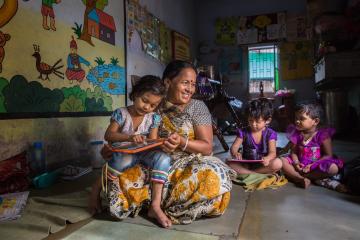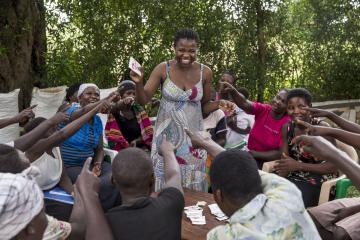
What the research says on improving women's economic agency and employment outcomes

Despite significant progress, women continue to face challenges to labor market engagement and economic agency. Increasing women’s labor force participation is key to achieving two of the United Nations (UN) Sustainable Development Goals (SDGs): Goal 5 on gender equality and Goal 8 on decent work. As decision makers consider their plans coming out of the UN’s International Women’s Day, policymakers and practitioners should look to incorporate lessons from rigorous evaluations to help meet the SDGs.
Through both the Gender and Economic Agency (GEA) Initiative and Jobs and Opportunity Initiative (JOI), J-PAL actively funds rigorous research that aims to answer key questions around how to solve these ongoing labor market challenges for women. In this blog, we summarize ongoing research and lessons from randomized evaluations funded by GEA and JOI which address open questions related to women’s work and economic empowerment.
What challenges do women face in the labor market?
Women around the world are less likely than men to participate in the labor force, with 47.4 percent of women participating in the global labor force compared to 72.3 percent of men as of 2022. Among women in low- and middle-income countries who have entered the labor force, they are more likely to earn less than men and be unemployed. They are also overrepresented in informal employment, which often comes with greater risks and more limited opportunities due to limited legal protections.
These statistics lay a foundation for the persistent challenges remaining for greater women’s labor market engagement. For example, women may lack the necessary skills employers are seeking and may face specific barriers to joining training programs and thriving in them. Women also disproportionately face harassment in public, hindering how they may get to work and potentially increasing the likelihood of violence they may face at work. Furthermore, as women perform the lion's share of unpaid work and domestic care, the lack of affordable care options for children and other family members also impedes their work opportunities. Gender norms underpin these and other barriers to women’s employment.
Women also face significant credit constraints and other social barriers when trying to grow their businesses. For example, there may be barriers that restrict women’s ability to use new skills or an influx of cash. In three studies featured in a J-PAL policy insight, female entrepreneurs learned and tried to implement new practices in their businesses, but they faced other barriers to profitability. Across four studies, women reported social norms, cultural restrictions, and domestic obligations as key barriers to their ability to use the skills and grow or start their businesses.
Globally, 527 million employed women work in sectors hit hardest by the Covid-19 pandemic like food service, retail, and entertainment. Women’s jobs remain at increased risk since employment recovery has been mainly in informal employment. Indeed, in 2022, four out of five jobs created for women were informal. Informal workers—58 percent of employed women—were and are particularly vulnerable, as they often faced low wages, poor conditions, and limited protections before the pandemic.
How is J-PAL working to address these challenges?
Throughout the last twenty years, J-PAL has prioritized and funded randomized evaluations to improve lives through scientific evidence. Since its founding, J-PAL has launched 28 research initiatives that concentrate funding and policy engagement around urgent policy-relevant questions.
A key challenge policymakers and the private sector face is a lack of evidence about which approaches to increasing women’s economic agency are effective and scalable, in which contexts they are successful, and why certain approaches work. This type of information can help policymakers ensure women’s work and economic agency are at the forefront of economic development efforts. Advancing women’s equal participation in the labor force can support economic growth and women’s economic empowerment, which may lead to positive social spillovers, such as investments in their children and household spending.
To address this challenge, J-PAL’s GEA Initiative, launched in 2020, aims to build a strong body of evidence on policies and programs to promote women’s work and enhance women’s economic agency. GEA funds innovative research focused on creating work opportunities that are attractive to and supportive of women; preparing women with the necessary skills to secure work and advance in their careers; and addressing restrictive gender norms and attitudes related to women’s work.
J-PAL’s JOI, launched in 2020 with support from Google.org, funds randomized evaluations to identify solutions to pressing employment challenges in low- to middle-income countries. JOI has a particular focus on job training and matching strategies, job creation, and the future of jobs, especially for underrepresented groups like women or youth. As women face increased barriers to entering and remaining in the labor market, multiple JOI-funded studies incorporate a gender lens and contribute to the growing body of evidence on women’s work.
Research is only one part of J-PAL’s approach to supporting evidence-informed policies; we also synthesize evidence to share with policymakers and inform their strategies on women’s work and economic agency. For example, GEA conducted a literature review on ways to increase women’s agency, and JOI published a policy insight emphasizing which components of vocational training programs may benefit women.
GEA- and JOI-funded studies are addressing some of the key challenges to improving women’s work and economic agency.
Aligned in their mission, GEA- and JOI-funded research is helping answer questions on promoting women’s work and bolstering economic agency. For example, both GEA and JOI have funded studies in Kenya aimed at improving business outcomes of women-led microenterprises. In a project funded by JOI, researchers conducted a randomized evaluation to test the impact of providing cash transfers to female entrepreneurs during the pandemic on their business outcomes and behavior. Cash transfers helped female entrepreneurs maintain their livelihoods, increasing profit, inventory spending, and food expenditures.
In another GEA-funded evaluation in Kenya, researchers are testing whether a mentorship program for women-led microenterprises has an impact on women’s empowerment. The intervention is part of a follow-up to a randomized evaluation that found both classroom training and mentorship led to changes in the use of business practices, but only mentorship increased average business profits while in-class training had no effect.
In India, a randomized evaluation jointly funded by GEA and JOI tested the impact of a month-long, flexible, at-home, paid work opportunity on women’s future uptake of work, well-being, and gender attitudes held by household members, including children. Results are forthcoming, but this research will answer key questions related to improving female labor force participation through flexible, internet-mediated gig work.
A JOI-funded study in Ghana is testing whether the involvement of spouses in personal initiative training has an impact on the growth potential of female-owned businesses. This evidence emphasizes the importance of societal norms and related cultural constraints on women's business performance beyond market conditions and standard training programs. If successful, researchers are hoping to scale the personal and family initiative training into other regions, providing additional evidence on how to successfully scale up soft skills training programs and spur business growth and inclusion for women.
A GEA-funded study in India is evaluating the impact of offering married men information about other men’s perceptions of female labor force participation. Female labor force participation in India is one of the lowest in the world, and studies suggest this is partially the result of restrictive gender norms about women’s employment, household work, and childcare responsibilities. Researchers are interested in studying how receiving this information might impact men’s willingness to allow their working-age wives to join the labor force. Results are forthcoming, and this evaluation will improve our understanding of the potential to advance women’s work by addressing restrictive gender norms and attitudes.
While women continue to face barriers to exercising agency in economic decisions, such as labor force participation, and many open questions remain, these and other GEA- and JOI-funded evaluations are helping address research gaps and informing decision makers on approaches to improve women’s work and economic agency



